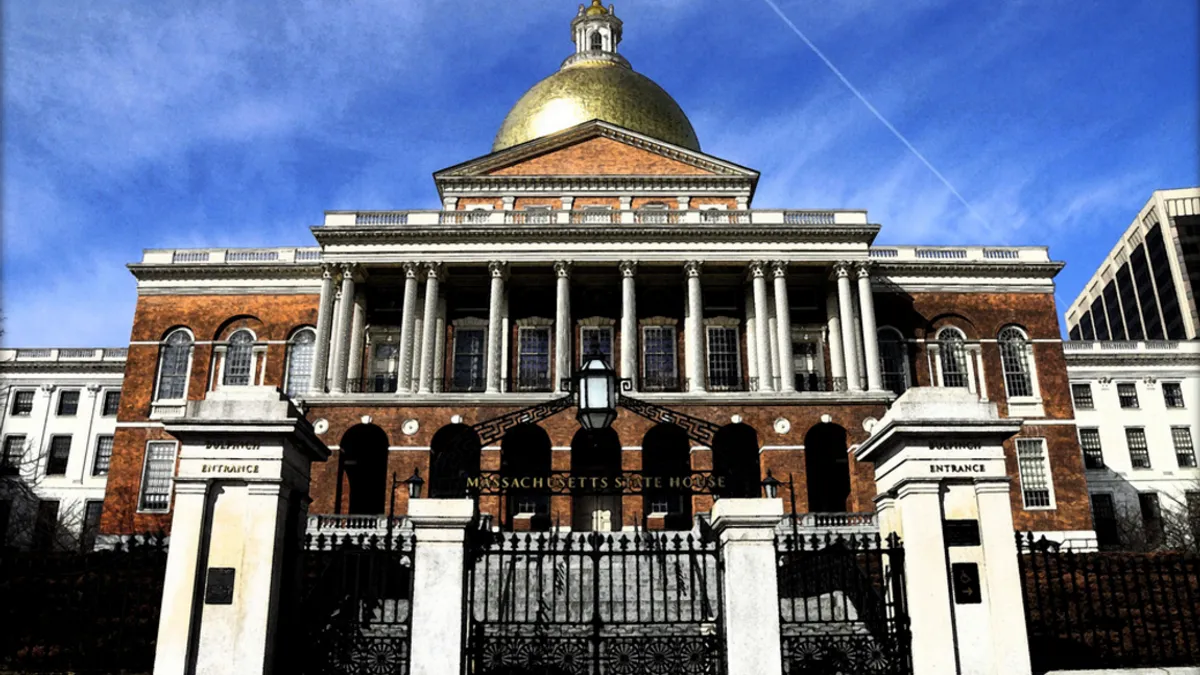Dive Brief:
- Massachusetts lawmakers are considering bills that would advance the state's interest in microgrids and require the consideration of non-wires alternatives before utilities make investments in grid upgrades.
- The bill, H. 1725, would require utilities to provide "publicly accessible hosting capacity maps" detailing opportunities for distributed energy resources, identify locational-based incentives for DERs, and to competitively seek non-wires projects for necessary grid upgrades. The measure would also direct utilities to offer time-of-use rate options by 2018 and put limits on fixed charge increases.
- The state's utilities would also be directed to develop grid modernization plans every five years and submit them to a state Grid Modernization Board that would include representatives from multiple government agencies. Utilities would submit their plans for grid upgrades and non-wires alternatives to this board for approval.
Dive Insight:
Massachusetts is considering legislation that could give a big boost to DERs, compelling utilities to consider alternatives to traditional power system infrastructure when considering grid upgrades.
H. 1725 would require utilities, when proposing new infrastructure, to provide a "description of the alternatives to the facility," including other methods of transmitting or storing energy, other site locations, other sources of electrical power or gas, load management, or local energy resource alternatives.
The proposed Grid Modernization Board or a contractor selected by it would assess "the total projected costs and economic benefits to ratepayers of the Infrastructure Resource Facility, as well as of the local energy resource alternative(s), over the effective life of the proposed Infrastructure Resource Facility," according to the legislation.
The Grid Modernization Board would consist of eight members, including the head of the Department of Energy Resources, the state's attorney general and environmental officials, and gubernatorial appointees to represent consumer interests.
The bill would also put restrictions on rate design changes, prohibiting utilities from instituting fixed charges higher than the cost of connection, billing and the provision of customer service. TOU rates would have to be made available to default service customers by the beginning of 2018.
Peter Shattuck, Massachusetts director for the Acadia Center and the Alliance for Clean Energy Solutions, which is supporting the bill, told Microgrid Knowledge that declining cost of solar and efficiency, and the state's growing interesting battery storage, are fueling an interest in modernization.
“We’re glad to see utilities entering the energy storage market. Eversource, in their rate case, has a significant $100 million of storage proposed across four projects. But there is a clearly a big market for behind-the-meter storage as well,” Shattuck said.
Earlier this year Eversource unveiled a $400 million modernization proposal. Roughly $145 million of the modernization plan will go to storage and EV charging, and $254 million will be spent on distribution automation.
The plan was created following a September report from state's Department of Energy Resources, recommending the state install 600 MW of energy storage. The DOER is currently working on codifying that recommendation into a regulatory goal for utilities, set to be released July 1.
Massachusetts lawmakers are also considering raising the state's renewable portfolio standard, which currently targets 15% green power by 2020. Clean energy groups supporting a measure to raise that to up to 50% by 2030.













